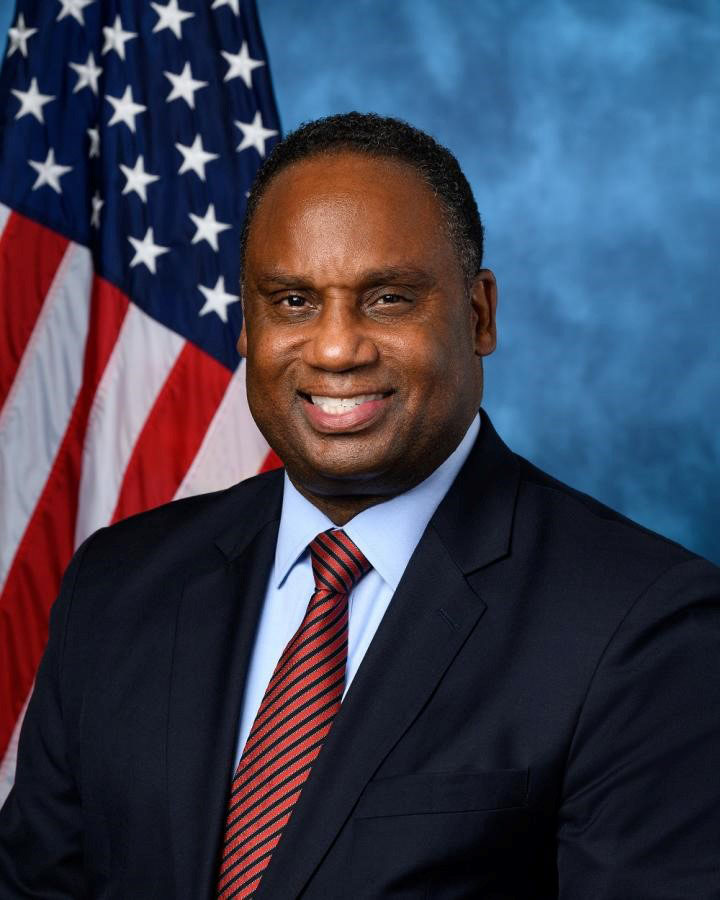By Khadidja Ba
US Congressman Jonathan Jackson has reaffirmed his commitment to assisting young black entrepreneurs in Guyana and residents of Mocha/Arcadia.
During an interview with Stabroek News on June 13, 2024. He emphasized the importance of connecting them with members of the diaspora who can collaborate locally and globally, enabling them to seize opportunities and contribute to the country’s economic growth.
During his visit to Guyana in May this year, Congressman Jackson, son of Civil Rights Activist Reverend Jesse Jackson, met with villagers from Mocha/Arcadia to address their concerns. Jackson was joined by Minister Kwame McCoy from the Office of the Prime Minister. The meeting, which took place on May 28, 2024, at the Mocha Community Centre, became a platform for residents to voice grievances over purported government injustices, such as land disputes and flooding. Tensions rose as discussions intensified, with Congressman Jackson promising to champion their issues to President Irfaan Ali and his colleagues in the US Congress.
Following his visit, Congressman Jackson agreed to an interview with Stabroek News and said that he has “shared a formal document with the ranking member of our visit to Guyana and specifically to Mocha and I have ongoing conversations with people in Mocha”. In this document he has not described anything as he saw or heard as “human rights violations”, however he outlined his “observations and recapping of the tremendous meetings and potential” he saw in Guyana.
Jackson further stressed the importance of Guyanese pride and recognition of their inherent potential, “The eco-tourism is a spectacular industry that’s yet to be developed…the native American communities there in their rich traditions that have still not have been disconnected yet remain that aspect of being preserved”.
Drawing a poignant analogy, Jackson likened the unity and appreciation of each societal segment to the Japanese tradition of mending broken bowls with gold, where the cracks and fragments highlight the beauty of the whole. This, he believes, creates a “beautiful mosaic right in our hemisphere” that celebrates diversity while fostering unity.
The Congressman also drew parallels between American and Guyanese histories. Both nations, he noted, share diverse, multi-ethnic societies that have grappled with dark chapters of history, including genocides of Native populations and the “kidnapping and importation of African bodies”. Reflecting on Guyana’s demographics, which include “massive immigration” of people of Chinese, Indian, and other Asian descents, Jackson emphasized the importance of acknowledging and healing from these historical wounds.
Recounting his visit, Congressman Jackson spoke passionately about the potential for both countries (USA and Guyana) to undergo a renaissance, focusing on healing and unity. “I think Guyana can look outside and see where America has come from and there are a lot of great examples of how the country [Guyana] can model itself for a beautiful future with all of those great assets” he remarked. He highlighted the resilience and creativity of individuals as being pivotal to shaping a prosperous future for any nation.
Jackson also underscored Guyana’s immense potential, emphasizing that its greatest resources lie not beneath the ground but within its people and their ingenuity. “The greatest asset in Guyana is not below the soil, as in oil, but it’s above the soil, in the people, in the forestry, in the ingenuity and the creativity. There is a huge opportunity for Guyana to highlight the multicultural aspects and to highlight the cultural influences” he stated, pointing to the country’s vibrant tapestry of cultures as a source of strength and unity.
Congressman Jackson drew attention to the rapid development underway in the country, likening it to “having to build the plane while it’s flying.” In his remarks, he underscored the challenges inherent in this process, particularly concerning corporate responsibility.
Touching upon economic prospects, Jackson acknowledged Guyana’s burgeoning oil and gas sector, noting its potential to generate wealth that can benefit all Guyanese in addition to all the abundance the country currently has. “President Ali has laid out a vision for the future, there is high hopes and great promise and a great opportunity to do something that is culturally and economically as vibrant as the UAE to continue to build up the people, and we are looking forward to Guyana sharing this multi-cultural ethnic community continuing to grow together” he added optimistically. Echoing concerns about the impact of rapid growth on Guyana’s social fabric and economic landscape, Jackson underscored the need for inclusive growth that benefits all citizens. “With good corporate responsibility and with good corporate citizenship,” he remarked, “the country will be able to satisfy all of their local demands and needs.”
He emphasized the critical importance of managing these newfound resources responsibly, ensuring that fair taxation and equitable distribution of wealth benefit the Guyanese population.
Jackson asserted that ExxonMobil has a heightened responsibility to ensure they continue sharing the benefits of the nation’s resources with its people. He is confident they will prudently manage this, potentially making Guyana a larger oil producer than Kuwait within the next 5 years. He stressed the necessity for corporations operating in Guyana to practice good citizenship by contributing positively to local communities and fulfilling their obligations to the nation.
Jackson further acknowledged President Ali’s warm hospitality and encouragement. He expressed deep gratitude for the chance to interact with the residents of Mocha and Albouystown, as well as engage with members of the Opposition. Jackson specifically thanked the residents who openly shared their stories during his visit. Reflecting on his meetings, he praised Leader of the Opposition Aubrey Norton as “kind and generous,” conveying his keenness to revisit Guyana in the future.






